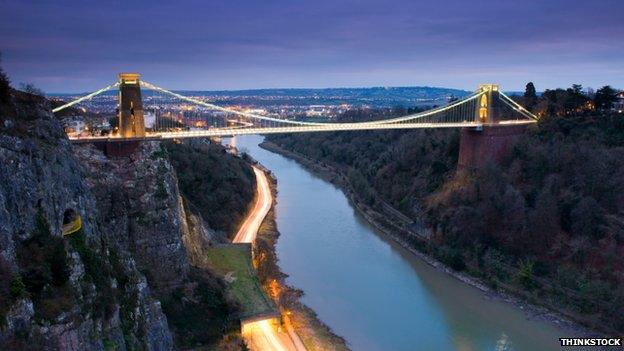Why does Bristol never build anything?
- Published

The Clifton Suspension Bridge - creation of the great Victorian engineer Isambard Kingdom Brunel - is Bristol's dominant landmark. But visitors could be forgiven for thinking this was the last significant structure built in the city.
Bristol has been beset by planning inertia in recent years. Three high-profile plans for two stadiums and a concert venue have failed to get past the planning phase against a backdrop of local protests and political wrangling.
But just an hour away in Cardiff a string of grands projets have been built - including the Millennium Stadium, the Millennium Centre and - more recently - the Cardiff City and Swalec stadiums.
How is it that Cardiff can deliver where Bristol cannot?
When England hosts the Rugby World Cup in 2015, a number of games will be played at Cardiff's Millennium Stadium, as well as at 12 stadiums across England. No games will be played in Bristol, though, because "there is no decent stadium", says Rhodri Morgan, Wales' First Minister from 2000 till 2009.
"There's not many things [Bristolians] still feel jealous of," he said. "It's far more prosperous as a town, senior lawyers and accountants that serve South Wales and the South West are based there and the airport and sea port are far more prosperous.

Cardiff has built the Swalec Stadium, Cardiff City Stadium, Wales Millennium Centre and the Millennium Stadium while Bristol has built nothing of note
"One thing they do feel jealous about is the 'grands projets' side of things where Cardiff has stolen a march."
An independent report published last month showed the Millennium Stadium alone generates more than £130m a year for Cardiff and Wales and sustains more than 2,500 permanent jobs.
Yet in Bristol, repeated attempts to build two stadiums have failed.
Bristol City FC's attempts to build a new stadium at Ashton Vale have been particularly tortuous. Plans were approved in 2009 but fervent opposition by residents has resulted in two planning inquiries (the second is due to be held this year) and an abandoned judicial review.
Similarly, the club's rivals, Bristol Rovers, have been trying to build a new stadium since 2005. While its plans have been approved, local traders and residents will seek a judicial review in March into the decision to build a supermarket at the site of the current ground in order to fund the move.
So is Bristol's problem an old-fashioned case of Nimbyism?
Daniella Radice, leader of the council's Green Party group and an opponent of the Bristol Rovers stadium plan, says not.
"I am in favour of a new stadium, just not financed by a large supermarket in an unsuitable location," she says.
"I think it is an over simplistic narrative, and mistaken, to look at community action as the reason for non-completion of projects and it would be more realistic to consider wider economic factors.
"I have no view on Cardiff as I do not know anything about the situation there. I do not see our cities as being in competition."
One obvious difference between Bristol and Cardiff is Wales' devolved status. However, planning law in the two countries has remained very similar, says Martin Loughlin, a local government expert at the London School of Economics, although he said Welsh policy may have been "more flexible".
So is the problem a question of political willpower?
Russell Goodway, former Lord Mayor of Cardiff, said the impression big projects went smoothly in the city was like "the swan on the surface, with feet paddling like hell underneath".
"When you boil it down, the difference is whether there's determined political leadership to see it through," Mr Goodway said.
"The leadership has to be convinced what they are doing is the right thing and when it's completed people will see the benefit."
Political change has taken place in Bristol - since 2012 the city has had an elected mayor, George Ferguson, who is a strong supporter of the stadium plans.
On Thursday, the council's cabinet meets to discuss £91m plans for the Bristol Arena - an idea for a concert venue which was first mooted 10 years ago.
Since he was elected mayor in November 2012, Mr Ferguson has agreed £250,000 from council reserves should be spent on developing the arena project and its business case.
Bristol City FC also had some good news with plans to revamp its current stadium given the go-ahead.
The club has met with Mr Ferguson to discuss its options and is expected to announce shortly whether it will go ahead with the revamp plan or pursue its original option of a stadium at Ashton Vale.
Mr Ferguson said Cardiff was a "special case" and that success had come from "an amazing project with the Millennium Stadium", its position as a capital city, a recipient of more European funding and greater political backing arising out of Welsh devolution.
"Cardiff had very strong leadership at the time it built its stadium," he said. "I think it's a matter of having somebody at the top who's not going to take no for an answer. That's the biggest single factor when you look at cities that succeed.
"I don't like to write things off as Nimbyism. You need to look for the right sites for delivery of projects. It's not surprising there's controversy when we're talking about building supermarkets or building on greenfield sites."
He added he was trying to ensure Bristol gets "a huge amount of attention" and said Cardiff now looked to his city "with envy on our progress with enterprise".
The Arena is due to open in June 2017 and Mr Ferguson expects Bristol's building plans to be back on track by then.
"2017 will be when a lot of this comes together," he said.
- Published4 December 2013
- Published28 November 2013
- Published27 November 2013
- Published18 October 2013
- Published18 May 2011